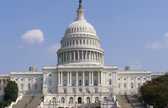

Obama Administration Announces New Steps to Protect Students from Ineffective Career College Programs. Today, the Obama Administration released final regulations requiring career college programs to better prepare students for "gainful employment" or risk losing access to Federal student aid.
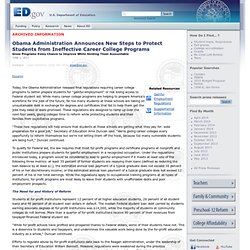
While many career college programs are helping to prepare America's workforce for the jobs of the future, far too many students at these schools are taking on unsustainable debt in exchange for degrees and certificates that fail to help them get the jobs they need or were promised. Obama Administration Announces New Steps to Protect Students from Ineffective Career College Programs. The Student Loan Forgiveness Act: H.R. 4170: To increase purchasing power, strengthen economic recovery, and restore fairness in financing higher education in the United States through student loan forgiveness, caps on interest rates on Federal student lo. Order determined by social media popularity Endorsing Organizations Aging With Student Debt 172 Facebook fans 154 Twitter followers This is a fair and sound approach to providing relief to past, current and future borrowers.
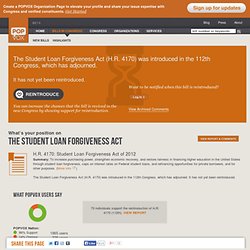
It addresses the pitfalls of the current IBR plan for Federal student loans and provides much needed relief for Private student loan borrowers. The end result of passing this bill will be a stronger economy for all. Read full position statement. More Info: Student Debt Reform Generational Justice 2 Facebook fans 144 Twitter followers. Silent Majority: California's War on its Students. S.1102: Fairness for Struggling Students Act of 2011. Close 114th Congress: We're updating with new data as it becomes available.
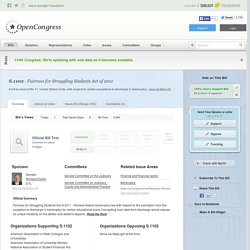
A bill to amend title 11, United States Code, with respect to certain exceptions to discharge in bankruptcy. view all titles (2) This Bill currently has no wiki content. R. 2028: Private Student Loan Bankruptcy Fairness Act of 2011 (GovTrack.us) Fair Debt Collection Practices Act. The Fair Debt Collection Practices Act (FDCPA), Pub.
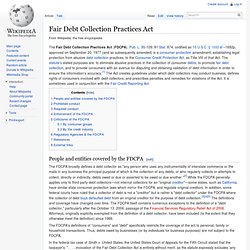
L. 95-109; 91 Stat. 874, codified as 15 U.S.C. § 1692 –1692p, approved on September 20, 1977 (and as subsequently amended) is a consumer protection amendment, establishing legal protection from abusive debt collection practices, to the Consumer Credit Protection Act, as Title VIII of that Act. John Boehner. John Boehner currently serves the 8th Congressional district of Ohio John Andrew Boehner, a Republican, has represented the 8th Congressional district of Ohio in the U.S.
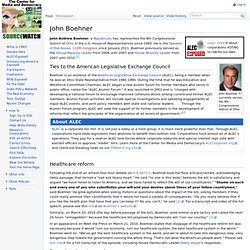
House of Representatives since 1993. He is the Speaker of the House, 112th Congress since January 2011. Boehner previously served as the House Majority Leader from 2006 until 2007 and House Minority Leader from 2007 until 2010.[1] Ties to the American Legislative Exchange Council. Bayh-Dole Act. Enacted on December 12, 1980, the Bayh-Dole Act (P.L. 96-517, Patent and Trademark Act Amendments of 1980) created a uniform patent policy among the many federal agencies that fund research, enabling small businesses and non-profit organizations, including universities, to retain title to inventions made under federally-funded research programs.This legislation was co-sponsored by Senators Birch Bayh of Indiana and Robert Dole of Kansas.The Bayh-Dole Act was especially instrumental in encouraging universities to participate in technology transfer activities.
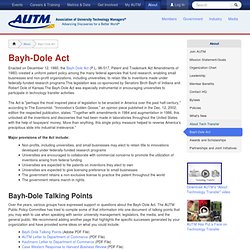
The Act is "perhaps the most inspired piece of legislation to be enacted in America over the past half-century," according to The Economist. Auction 2012: For-Profit Colleges Win When Lobbying Blitz Weakens Regs. Auction 2012 is a weeklong series in collaboration with "The Dylan Ratigan Show" and United Republic.
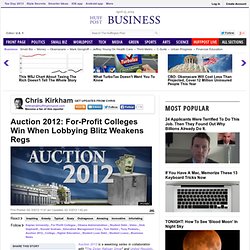
As the Great Recession propelled millions into the ranks of the unemployed more than three years ago, one industry in particular saw a surge in new business: for-profit higher education. Enrollments and revenues skyrocketed at publicly traded corporations such as Education Management Corp. and Bridgepoint Education, which aggressively promoted degree programs said to offer crucial job training. The swift growth captured the attention of the Obama administration: Data showed that for-profit colleges accounted for nearly half of the defaults on federal student loans, despite educating only about 10 percent of the nation's college students. Beginning in 2010, the administration announced a broad package of new regulations that would crack down on programs that leave students with outsized debt and few career prospects. Don't blame for-profit colleges for the higher-ed lobbying epidemic - Education. The last two years have not been kind to for-profit colleges.
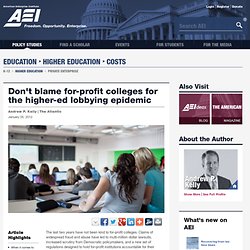
Claims of widespread fraud and abuse have led to multi-million dollar lawsuits, increased scrutiny from Democratic policymakers, and a new set of regulations designed to hold for-profit institutions accountable for their graduates' future employment. The for-profits responded as most firms in the cross-hairs of federal regulators do: They hired lobbyists. Lots of them. When the Obama administration softened the proposed regulations, many observers chalked it up to the costly lobbying effort. For-profit schools lobby to avoid proposed federal aid rule. Companies that run colleges and trade schools for profit are mounting a full-tilt, high-dollar campaign against an Obama administration effort to tighten rules for their access to federal aid.
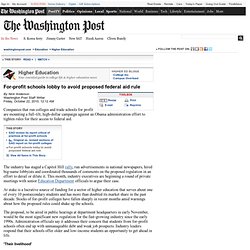
The industry has staged a Capitol Hill rally, run advertisements in national newspapers, hired big-name lobbyists and coordinated thousands of comments on the proposed regulation in an effort to derail or dilute it. This month, industry executives are beginning a round of private meetings with senior Education Department officials to argue their case. At stake is a lucrative source of funding for a sector of higher education that serves about one of every 10 postsecondary students and has more than doubled its market share in the past decade. Stocks of for-profit colleges have fallen sharply in recent months amid warnings about how the proposed rules could shake up the schools. 'Their livelihood' "It's their livelihood," said Mark Kantrowitz, a college-finance analyst with the Web site FinAid.
How the UC Regents Spin Public Funds into Private Profit. “As universities become glorified vocational schools for corporations they adopt values and operating techniques of the corporations they serve.” – Chris Hedges (Empire of Illusion, 2009) This piece has been republished by The Berkeley Daily Planet.

A version of it also ran in the Sacramento News & Review, Santa Cruz Weekly, North Bay Bohemian, and the SF Public Press.